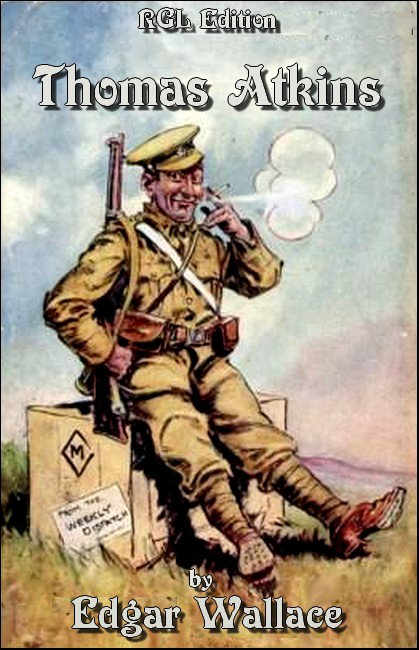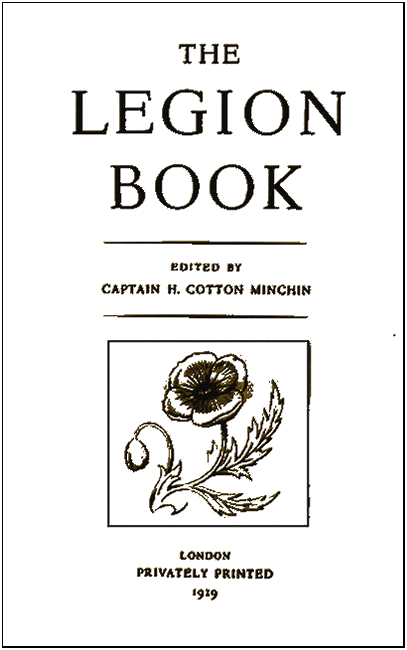
RGL e-Book Cover©
Roy Glashan's Library
Non sibi sed omnibus
Administered by Matthias Kaether and Roy Glashan
Go to Home Page
This work is out of copyright in countries with a copyright
period of 70 years or less, after the year of the author's death.
If it is under copyright in your country of residence,
do not download or redistribute this file.
Original content added by RGL (e.g., introductions, notes,
RGL covers) is proprietary and protected by copyright.

RGL e-Book Cover©


Title Page of "The Legion Book," 1929
OLD soldiers may die, but their traditions are eternal. I doubt very much, if any soldier of the Crimea walked into a modern barrack-room, that he would feel in the slightest degree embarrassed by the spirit of modernity; and, beyond the change of arms and equipment, he would discover nothing novel in the language of the 1920 soldier.
Still would he find the desperate expedients that kit inspections bring into operation; still would he hear bitter complaints about the quality of the canteen beer; and to his ears would come the familiar groan of the old sweat with twenty years' service telling the youngsters how soldiering was soldiering in the good old days.
The barrack-room is insular. The great events of the world pass on and leave no trace of their interest. New words come into the barrack-room vocabulary—strange foreign words with queer English sounds; for it is a fact that every war in which the British Army is engaged brings a few odd words and expressions into the everyday language of the barrack-room. I wonder how many people realize that 'bosh', as indicating rubbish, is an Army word which the soldiers brought back from Turkey. They acquired one or two from South Africa; another couple remain from the Great War.
In one respect there must have been a drastic change. In my day—I first made my acquaintance with barrack-room life at the age of seventeen—the Army was packed stiff with singers. They weren't good singers, but they sang. You heard them every night in the canteen; you heard them every day in the barrack-rooms and passages, warbling sentimentally. But the character of the songs has probably changed, for in the early 'nineties, and for twenty or thirty years before, the supreme favourites were Irish revolutionary songs!
Songs about Ireland have had an irresistible fascination for Tommy, and it is an historical fact that it was to the strains of 'Tipperary' that the Old Contemptibles performed their most heroic deeds. But 'Tipperary' was a lively tune compared with the more favoured ditties which held the attention of a soldier audience. It was a vital ingredient of most of the songs that we sang in the early days that they should be sentimental, and should deal with poor Irish heroes who had been done to death by the brutal English soldiery. A typical example was 'The Young Hero', the refrain of which ran, if my memory serves me:
To the old British square they marched our young hero.
'Aim straight at my heart' were the last words he said.
Exposing his breast to the points of their rifles,
When the smoke cleared away our young hero lay dead.
So they laid him away on the hillside,
Along with the brave and the bold.
Inscribed his name on the scroll of fame
In letters of purest gold.
'My conscience will never convict me',
He said with his last dying breath.
'May Gawd plead the cause of freedom
For which I am sentenced to death!'
I have heard this same song sung by request four times in one evening! And it was not amongst Irish troops that these songs were popular. Their most enthusiastic singers were the men of the county regiments, and especially the 'London' regiments (the West Kent, Middlesex, 7th Fusiliers, East Surrey, etc.).
I haven't been in a barrack-room for twenty years, but I am almost tempted to go forth on a visit of discovery to learn what has supplanted the sentimentalism of Erin.
The woes and wrongs of Ireland in lyrical form have charmed and thrilled generations of soldiers, and I do not remember one native song that has ever been brought back from any other part of the world.
India has contributed in a very great measure to the vocabulary of the British soldier. Certain Indian words like 'rutee'* are traditional, and will persist long after our association with India has terminated—as some clever people tell us it will terminate.
[* rutee: Hindi word for bread.]
I was privileged the other day to read a letter written by an officer to his wife. He was serving under Marlborough, and one passage in the letter rather amused me:
The soldiers complain, and continue to complain. They complain about the food, about the length of the marches—which, as you may well imagine, are long and tedious—about their billets and their duties, and this was spoken of to my lord (the Colonel) whilst we were at dinner this afternoon. My lord said: 'When you have had my experience with English soldiers, Captain Wright, you will know that they will grumble on all occasions, and fight all the better for it.'
A grouseless British Army would be a monstrosity. Tommy grouses, not because he is a soldier, but because he is British and because it is part and parcel of the national character to grumble when things are going well and to be uncannily cheerful when things are going badly. There is a song, 'Pack Up Your Troubles in Your Old Kit Bag'. This did not inspire the soldier—the soldier inspired the song. For in adversity there is no more buoyant creature than he. I remember during the South African War that if one were under a roof for the night it was always possible to tell when rain was falling upon the roofless bivouac. From out of the darkness came the melancholy strains of the latest music-hall song—invariably when it started raining on the men who had no shelter but their blankets the troops sat up and sang.
I am curious to know whether certain little practices in the Army have persisted through the years. Is the square-pushing uniform as popular as ever? I rather doubt it, because the square-pusher depended very much upon the smartness of the pre-war uniform. Khaki is not an incentive to smartness and clothes-pride; and, moreover, the privilege recently granted to soldiers of appearing in public wearing the mufti of civilians must have done away with the master-tailor's perks.
In the days when soldiers wore red coats and blue trousers, the dandy had many opportunities of beautifying himself and enhancing his personal attractions. Square-pushing boots, square-pushing caps, silver cap-badges, and a few etceteras which were distinctly non-regimental, lent him some of the fascination of the male peacock.
When Kipling wrote 'Tommy This and Tommy That' he was putting into concrete form the one conviction which never dies in the Army, and it is that the soldier is despised by the civilian population and that his honourable trade is regarded by respectable people as something to be ashamed of.
It is a curious fact that the Army is very unpopular among the lower middle classes as a profession for their sons and brothers. Why that should be so has been a mystery, but here again the tradition continues. If only the lower middle classes realized the fact, the Army is the real poor man's university. It is to the Army that every young man without a definite profession should be sent to complete his education, to engraft in him a wider knowledge of men and things, and to supply him with a much-needed stimulus to a profession. It would be all to the good of the country if every young man who attained the age of from eighteen to twenty-four, and had not settled down to productive work, should by law be compelled to take the Army 'course'. This modified form of conscription would bring about a radical change, not only in the attitude of certain sections of the population towards soldiering, but in the physique of the nation.
My own impression is that the attitude of the civilian has undergone a very considerable change since the war. That a soldier should not be served in certain bars and public-houses is unheard of in this year of grace, but, strangely enough, the barrack-room view remains that this is still a practice. When, the other day, I invited a man of twenty-one years' service to come to lunch with me at a restaurant (I think he was passing through London on duty), he was aghast at the idea.
'You will get chucked out if you take me there,' he said. 'Everybody knows that they won't have soldiers in West End restaurants.'
While I confess I expected all the old ideas and notions, in fact the very character of the soldier, to have been burned up in the war, and a new type to have emerged, a visit to a military centre finds the Army just as I left it, and I can pick up the same old soldier that I knew and loved in the days of my service. He has the same dodges for evading work, the same bubbling humour, not less funny because of its dourness, the same simplicity of nature and generosity of soul. The words you might not use in a barrack-room are still tabooed; the man who whistles the 'Dead March' is 'for it'; still persists the idea, which dies very hard indeed, that the quartermaster-sergeants buy rows of houses on their illicit gains.
One aspect of the modern Army life I find very curious. In the old days one was not allowed, and certainly nobody seemed to have a desire, to discuss politics in the barrack-room. Giving the soldier the vote was one of the most revolutionary steps ever taken in the history of the Army, and for my own part I believed that it would have a most demoralizing effect. There were neither Liberals, Conservatives, nor Socialists in the barrack-room, and politics came into the same category as religion. It was one of the forbidden subjects of controversy. The curious thing is that, even though the soldier is given the vote, politics are still more or less tabooed. Very wisely the Army authorities do not allow canvassing of military voters, nor encourage candidates to address meetings for soldiers only; and the consequence is that, although the vote has come, it has had practically no effect upon the amenities of barrack-room life.
There is a mystery about the British soldier, a mystery which no man has solved. It is the mystery of the mould in which he was cast, and in which every new recruit is hammered. Why is there no variation? Why is this type eternal? What is there in the Army which broadens and quickens a man's sense of humour and creates the corps spirit which is nine-tenths of efficiency?
For the solution, I suppose, one must go back to the national character, and compare the phenomenon of the soldier's spiritual and mental development with the same process which is going on in the public schools, and which licks the biggest lout into the semblance of a gentleman. Certainly, the soldier does not change for the worse. He could not change for the better.
Roy Glashan's Library
Non sibi sed omnibus
Administered by Matthias Kaether and Roy Glashan
Go to Home Page
This work is out of copyright in countries with a copyright
period of 70 years or less, after the year of the author's death.
If it is under copyright in your country of residence,
do not download or redistribute this file.
Original content added by RGL (e.g., introductions, notes,
RGL covers) is proprietary and protected by copyright.